A monotheistic faith and the world’s second-largest religion.
Followers of Islam, known as Muslims, believe that God (or, in Arabic, Allah) revealed his direct word for mankind to Muhammad and other prophets, including Adam, Abraham, Moses, and Jesus.
Muslims assert that the main written record of revelation to humankind is the Qur’an, which they believe to be flawless, immutable, and the final revelation of God. Muslims believe that parts of the Bible and the Torah have been forgotten, misinterpreted, or distorted by their followers. With that perspective they view the Qur’an as corrective of Jewish and Christian scriptures.
Muslims hold that Islam is essentially the same belief as that of all the messengers sent by God to mankind since Adam, with the Qur’ān (the one definitive text of the Muslim faith) codifying the final revelation of God.
Islamic teaching sees Judaism and Christianity as derivations of the teachings of certain of these prophets – notably Abraham – and therefore acknowledges their Abrahamic roots, whilst the Qur’an calls them People of the Book.
Islam has two primary branches of belief, based largely on a historical disagreement over the succession of authority after Muhammad’s death; these are known as Sunni and Shi’ite.
Islam (/ˈɪslɑːm/;[a] Arabic: اَلْإِسْلَامُ, romanized: al-’Islām, [ɪsˈlaːm] (![]() listen) “submission [to God]”)[1] is an Abrahamic monotheistic religion teaching that Muhammad is a messenger of God.[2][3] It is the world’s second-largest religion with 1.9 billion followers, or 24.9% of the world’s population,[4][5] known as Muslims.[6] Muslims make up a majority of the population in 47 countries.[7][8] Islam teaches that God is merciful, all-powerful, and unique,[9] and has guided humanity through prophets, revealed scriptures, and natural signs.[3][10] The primary scriptures of Islam are the Quran, believed to be the verbatim word of God, as well as the teachings and normative examples (called the sunnah, composed of accounts called hadith) of Muhammad (c. 570 – 632 CE).[11]
listen) “submission [to God]”)[1] is an Abrahamic monotheistic religion teaching that Muhammad is a messenger of God.[2][3] It is the world’s second-largest religion with 1.9 billion followers, or 24.9% of the world’s population,[4][5] known as Muslims.[6] Muslims make up a majority of the population in 47 countries.[7][8] Islam teaches that God is merciful, all-powerful, and unique,[9] and has guided humanity through prophets, revealed scriptures, and natural signs.[3][10] The primary scriptures of Islam are the Quran, believed to be the verbatim word of God, as well as the teachings and normative examples (called the sunnah, composed of accounts called hadith) of Muhammad (c. 570 – 632 CE).[11]
Muslims believe that Islam is the complete and universal version of a primordial faith that was revealed many times before through prophets such as Adam, Abraham, Moses, and Jesus.[12] Muslims consider the Quran, in Arabic, to be the unaltered and final revelation of God.[13] Like other Abrahamic religions, Islam also teaches a final judgment with the righteous rewarded in paradise and the unrighteous punished in hell.[14] Religious concepts and practices include the Five Pillars of Islam, which are obligatory acts of worship, as well as following Islamic law (sharia), which touches on virtually every aspect of life and society, from banking and welfare to women and the environment.[15][16] The cities of Mecca, Medina and Jerusalem are home to the three holiest sites in Islam.[17]
From a historical point of view, Islam originated in early 7th century CE in the Arabian Peninsula, in Mecca,[18] and by the 8th century, the Umayyad Caliphate extended from Iberia in the west to the Indus River in the east. The Islamic Golden Age refers to the period traditionally dated from the 8th century to the 13th century, during the Abbasid Caliphate, when much of the historically Muslim world was experiencing a scientific, economic, and cultural flourishing.[19][20][21] The expansion of the Muslim world involved various caliphates and states such as the Ottoman Empire, trade, and conversion to Islam by missionary activities (dawah).[22]
Most Muslims are of one of two denominations: Sunni (85–90%)[23] or Shia (10–15%).[24][25][26] Sunni and Shia differences arose from disagreement over the succession to Muhammad and acquired broader political significance, as well as theological and juridical dimensions.[27] About 12% of Muslims live in Indonesia, the most populous Muslim-majority country;[28] 31% live in South Asia,[29] the largest percentage of Muslims in the world;[30] 20% in the Middle East–North Africa, where it is the dominant religion;[31] and 15% in sub-Saharan Africa.[31] Sizable Muslim communities can also be found in the Americas, China, and Europe.[32][33] Islam is the fastest-growing major religion in the world.
Etymology

The Kaaba in Mecca is the direction of prayer and destination of pilgrimage
In Arabic, Islam (Arabic:إسلام, “submission [to God]”) is the verbal noun originating from the verb سلم (salama), from triliteral root س-ل-م (S-L-M), which forms a large class of words mostly relating to concepts of wholeness, submission, sincerity, safeness, and peace.[36] Islam is the verbal noun of Form IV of the root and means “submission” or “total surrender”. In a religious context, it means “total surrender to the will of God”.[1][37] A Muslim (Arabic:مُسْلِم), the word for a follower of Islam, is the active participle of the same verb form, and means “submitter (to God)” or “one who surrenders (to God)”. The word “Islam” (“submission”) sometimes has distinct connotations in its various occurrences in the Quran. Some verses stress the quality of Islam as an internal spiritual state: “Whoever God wills to guide, He opens their heart to Islam.”[i][37] Other verses connect Islam and religion (dīn) together:[ii]
“Today, I have perfected your religion for you; I have completed My blessing upon you; I have approved Islam for your religion.”[38]
Others describe Islam as an action of returning to God—more than just a verbal affirmation of faith.[iii] In the Hadith of Gabriel, Islam is presented as one part of a triad that also includes imān (faith), and ihsān (excellence).[39][40]
The word “silm” (Arabic:سِلْم) in Arabic means both peace and also the religion of Islam.[41] A common linguistic phrase demonstrating its usage is “he entered into as-silm” (Arabic:دَخَلَ فِي السِّلْمِ) which means “he entered into Islam,” with a connotation of finding peace by submitting one’s will to the Will of God.[41] The word “Islam” can be used in a linguistic sense of submission or in a technical sense of the religion of Islam, which also is called as-silm which means peace.[41]
Islam itself was historically called Mohammedanism in the English-speaking world. This term has fallen out of use and is sometimes said to be offensive, as it suggests that a human being, rather than God, is central to Muslims’ religion, parallel to Buddha in Buddhism.[42] Some authors, however, continue to use the term Mohammedanism as a technical term for the religious system as opposed to the theological concept of Islam that exists within that system.
Articles of faith
Faith (iman, Arabic: إيمان) in the Islamic creed (aqidah) is often represented as the six articles of faith, notably mentioned in the Hadith of Gabriel. Belief in these articles is necessary and obligatory upon all Muslims.
Concept of God
The central concept of Islam is tawḥīd (Arabic:توحيد), the unity of God. Usually thought of as a precise monotheism, but also panentheistic in Islamic mystical teachings.[43] God is described in Chapter 112 of the Quran: Say, “He is God—One and Indivisible; God—the Sustainer ˹needed by all˺. He has never had offspring, nor was He born. And there is none comparable to Him.” No human eyes can see God till the Day Of Judgement.[44] According to Islam, God is transcendent, therefore Muslims do not attribute human forms to God. God is described and referred to by several names or attributes, the most common being Ar-Rahmān(الرحمان) meaning “The Entirely Merciful,” and Ar-Rahīm( الرحيم) meaning “The Especially Merciful” which are mentioned before reciting every chapter of the Quran except chapter nine.[45][46]
Islam teaches that the creation of everything in the universe was brought into being by God’s command as expressed by the wording, “Be, and it is,”[iv][47] and that the purpose of existence is to worship God without associating partners to Him.[v][48][49] God is not a part of the Christian Trinity.[50] He is viewed as a personal god who responds whenever a person in need or distress calls him.[vi][47] There are no intermediaries, such as clergy, to contact God, who states: “Your Lord has proclaimed, Call upon Me, I will respond to you.”[vii] Consciousness and awareness of God is referred to as Taqwa. Allāh is traditionally seen as the personal name of God,[51] a term with no plural or gender being ascribed to it. It is used by Muslims and Arabic-speaking Christians and Jews in reference to God, whereas ʾilāh (Arabic: إله) is a term used for a deity or a god in general.[52]
Angels
Belief in angels is fundamental to Islam. The Quranic word for angel (Arabic:ملك malak) derives either from Malaka, meaning “he controlled”, due to their power to govern different affairs assigned to them,[53] or from the triliteral root ’-l-k, l-’-k or m-l-k with the broad meaning of a “messenger”, just as its counterpart in Hebrew (malʾákh). Unlike the Hebrew word, however, the term is used exclusively for heavenly spirits of the divine world, as opposed to human messengers. The Quran refers to both angelic and human messengers as rasul instead.[54]
The Quran is the principal source for the Islamic concept of angels.[55] Some of them, such as Gabriel and Michael, are mentioned by name in the Quran, others are only referred to by their function. In hadith literature, angels are often assigned to only one specific phenomenon.[56] Angels play a significant role in literature about the Mi’raj, where Muhammad encounters several angels during his journey through the heavens.[56] Further angels have often been featured in Islamic eschatology, theology and philosophy.[57] Duties assigned to angels include, for example, communicating revelations from God, glorifying God, recording every person’s actions, and taking a person’s soul at the time of death.
In Islam, just as in Judaism and Christianity, angels are often represented in anthropomorphic forms combined with supernatural images, such as wings, being of great size or wearing heavenly articles.[58] The Quran describes “Angels as His messengers with wings—two, three, or four.”[viii][59] Common characteristics for angels are their missing needs for bodily desires, such as eating and drinking.[60] Their lack of affinity to material desires is also expressed by their creation from light: angels of mercy are created from nūr (‘light’)[61] in opposition to the angels of punishment created from nār (‘fire’).[62] Muslims do not generally share the perceptions of angelic pictorial depictions, such as those found in Western art.
Revelations
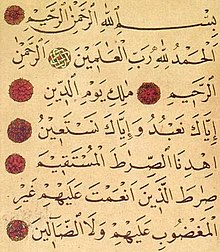
The first chapter of the Quran, Al-Fatiha (The Opening), is seven verses
The Islamic holy books are the records that most Muslims believe were dictated by God to various prophets. Muslims believe that parts of the previously revealed scriptures, the Tawrat (Torah) and the Injil (Gospel), had become distorted—either in interpretation, in text, or both.[63] The Quran (lit. “Recitation”) is viewed by Muslims as the final revelation and literal word of God and is widely regarded as the finest literary work in the classical Arabic language.[64][65]
Muslims believe that the verses of the Quran were revealed to Muhammad by God through the archangel Gabriel (Jibrīl) on many occasions between 610 CE until his death in 632.[66] While Muhammad was alive, these revelations were written down by his companions (sahabah), although the prime method of transmission was orally through memorization.[67] The Quran is divided into 114 chapters (suras) which combined contain 6,236 verses (āyāt). The chronologically earlier suras, revealed at Mecca, are concerned primarily with ethical and spiritual topics. The later Medinan suras mostly discuss social and legal issues relevant to the Muslim community.[47][68]
The Quran is more concerned with moral guidance than legislation, and is considered the “sourcebook of Islamic principles and values”.[69] Muslim jurists consult the hadith (‘accounts’), or the written record of Prophet Muhammad’s life, to both supplement the Quran and assist with its interpretation. The science of Quranic commentary and exegesis is known as tafsir.[70][71] The set of rules governing proper elocution of recitation is called tajwid. Muslims usually view “the Quran” as the original scripture as revealed in Arabic and that any translations are necessarily deficient, which are regarded only as commentaries on the Quran.[68][72]
Prophets and sunnah
According to the Quran, God instructed the prophets (Arabic: أنبياء, anbiyāʾ) to bring the “will of God” to the peoples of the nations. Muslims believe prophets are human and not divine, though some can perform miracles to prove their claim. Islamic theology says that all of God’s messengers preached the message of Islam—submission to the will of God. The Quran mentions the names of numerous figures considered prophets in Islam, including Adam, Noah, Abraham, Moses and Jesus, among others.[47]
Muslims believe that God finally sent Muhammad as the last law-bearing prophet (“Seal of the prophets”) to convey the divine message to the entire world (to sum up and to finalize the word of God). In Islam, the “normative” example of Muhammad’s life is called the sunnah (literally “trodden path”). Muslims are encouraged to emulate Muhammad’s actions in their daily lives, and the sunnah is seen as crucial to guiding interpretation of the Quran.[73] This example is preserved in traditions known as hadith, which recount his words, his actions, and his personal characteristics. Hadith Qudsi is a sub-category of hadith, regarded as God’s verbatim words quoted by Muhammad that are not part of the Quran. A hadith involves two elements: a chain of narrators, called sanad, and the actual wording, called matn. Hadiths can be classified, by studying the narration as: “authentic” or “correct” (صَحِيْح, ṣaḥīḥ); “good”, hasan (حَسَن, ḥasan); or “weak” (ضَعِيْف, ḍaʻīf), among others. The Kutub al-Sittah are a collection of six books, regarded as the most authentic reports in Sunnism. Among them is Sahih al-Bukhari, often considered by Sunnis to be one of the most authentic sources after the Quran.[74][75] Another famous source of hadiths is known as The Four Books, which Shias consider as the most authentic hadith reference.[76][77][78]
Because the Quran only briefly covered the lives of biblical prophets, scholars, poets, historians, and storytellers elaborate their stories in Tales of the Prophets. Many of these scholars were also authors of commentaries on the Quran; however, unlike Quran commentaries which follow the order and structure of the Quran itself, the Tales of the Prophets told its stories of the prophets in chronological order—which makes them similar to the Jewish and Christian versions of the Bible.
Besides prophets, saints possess blessings (Arabic:بركة , “baraka”) and can perform miracles (Arabic:امات, Karāmāt). Saints rank lower than prophets and they do not intercede for people on the Day of Judgment. However, both the tombs of prophets and saints are visited frequently (Ziyarat). People would seek the advice of a saint in their quest for spiritual fulfillment. Unlike saints in Christianity, Muslim saints are usually acknowledged informal by consensus of common people, not by scholars. Unlike prophets, women like Rabia of Basra, were accepted as saints.[79]
Resurrection and judgment
Belief in the “Day of Resurrection” or Yawm al-Qiyāmah (Arabic|يوم القيامة), is also crucial for Muslims. It is believed that the time of Qiyāmah is preordained by God but unknown to man. The Quran and the hadith, as well as in the commentaries of scholars describe the trials and tribulations preceding and during the Qiyāmah. The Quran emphasizes bodily resurrection, a break from the pre-Islamic Arabian understanding of death.[80]
On Yawm al-Qiyāmah (Arabic: يوم القيامة), Muslims believe all humankind will be judged by their good and bad deeds and consigned to Jannah (paradise) or Jahannam (hell). The Quran in Surat al-Zalzalah describes this as: “So whoever does an atom’s weight of good will see it. And whoever does an atom’s weight of evil will see it.” The Quran lists several sins that can condemn a person to hell, such as disbelief in God (كفر, kufr), and dishonesty. However, the Quran makes it clear that God will forgive the sins of those who repent if he wishes. Good deeds, like charity, prayer, and compassion towards animals,[81][82] will be rewarded with entry to heaven. Muslims view heaven as a place of joy and blessings, with Quranic references describing its features. Mystical traditions in Islam place these heavenly delights in the context of an ecstatic awareness of God.[83] Yawm al-Qiyāmah is also identified in the Quran as Yawm ad-Dīn (Arabic:يوم الدين “Day of Religion”);[ix] as-Sāʿah (Arabic:الساعة “the Last Hour”);[x] and al-Qāriʿah (Arabic:القارعة “The Clatterer”);[xi]
Divine Destiny
The concept of divine decree and destiny in Islam (Arabic: القضاء والقدر, al-qadāʾ wa l-qadar) means that every matter, good or bad, is believed to have been decreed by God and is in line with destiny. Al-qadar meaning “power” derives from a root that means “to measure” or “calculating”.[84][85] The Quran emphasises that nothing occurs outside of His divine decree: “Say, ‘Nothing will ever befall us except what God has destined for us’.”[86] Muslims often express this belief in divine destiny with the phrase “Insha-Allah” meaning “if God wills” when speaking on future events.[87][88]
Acts of worship
There are five core practices in Islam,[89] collectively known as “The Pillars of Islam” (Arkān al-Islām) or “Pillars of the Religion” (Arkān ad-din), which are considered obligatory for all believers. The Quran presents them as a framework for worship and a sign of commitment to the faith:[90] Three of the pillars are obligatory for all Muslims, while Zakāt and Hajj are obligatory only for able Muslims.[91] Both Sunni and Shi’a sects agree on the essential details for performing these acts.[90] Apart from these, Muslims also perform other religious acts. Notable among them are voluntary charity (Sadaqah) and recitation of the Quran.
Testimony
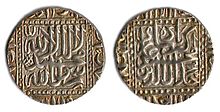
Silver coin of the Mughal Emperor Akbar, inscribed with the Shahadah
The shahadah,[92] which is the basic creed of Islam, must be recited under oath with the specific statement: “ʾašhadu ʾal-lā ʾilāha ʾillā-llāhu wa ʾašhadu ʾanna muħammadan rasūlu-llāh” (أشهد أن لا إله إلا الله وأشهد أن محمداً رسول الله), or, “I testify that none deserves worship except God and I testify that Muhammad is the messenger of God.”[93] This testament is a foundation for all other beliefs and practices in Islam. Non-Muslims wishing to convert to Islam are required to recite the creed.[94][95]
Prayer
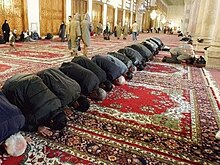
Muslim men prostrating in prayer, at the Umayyad Mosque, Damascus.
The five daily ritual prayers are called salah or ṣalāt (Arabic: صلاة|صلاة). Salat is intended to focus the mind on God and is seen as a personal communication with him expressing gratitude and worship. Salat consists of bowing and prostrating to God and praising God. Performing prayers five times a day is compulsory, but flexibility in the timing specifics is allowed depending on circumstances. The prayers are recited in the Arabic language and consist of verses from the Quran.[96] The prayers are done in direction of the Ka’bah. The act of supplicating is referred to as dua. Ritual purity is required for salat, this is achieved through wudu (ritual purification) or ghusl (full body ritual purification).
A mosque is a place of worship for Muslims, who often refer to it by its Arabic name masjid. A large mosque for gathering for Friday prayers or Eid prayers is called masjid jāmi (مَسْجِد جَامِع, “congregational mosque”).[97] Although the primary purpose of the mosque is to serve as a place of prayer, it is also important to the Muslim community as a place to meet and study. The Masjid an-Nabawi (“Prophetic Mosque”) in Medina, Saudi Arabia, was also a place of refuge for the poor.[98] Modern mosques have evolved greatly from the early designs of the 7th century and contain a variety of architectural elements such as minarets.[99] The means used to signal the prayer time is a vocal call called the adhan.
Charity
Zakāt (Arabic: زكاة, zakāh, ‘alms’) is a means of welfare in a Muslim society, characterized by the giving of a fixed portion (2.5% annually)[100] of accumulated wealth by those who can afford it to help the poor or needy, such as for freeing captives, those in debt, or for (stranded) travellers, and for those employed to collect zakat.[xii][101] It is considered a religious obligation (as opposed to supererogatory charity, known as Sadaqah) that the well-off owe to the needy because their wealth is seen as a “trust from God’s bounty”. Conservative estimates of annual zakat are that it amounts to 15 times global humanitarian aid contributions.[102] The first Caliph, Abu Bakr, distributed zakat as one of the first examples of a guaranteed minimum income, with each man, woman and child getting 10 to 20 dirhams annually.[103]
Sadaqah means optional charity practiced as a religious duty and out of generosity.[104] Both the Quran and the hadith put much emphasis on spending money for the welfare of needy people,[105] and have urged Muslims to give more as an act of optional charity.[xiii][106] The Quran says: “Those who spend their wealth in charity day and night, secretly and openly—their reward is with their Lord.”[xiv] One of the early teachings of Muhammad was that God expects men to be generous with their wealth and not to be miserly.[xv][107] Accumulating wealth without spending it to address the needs of the poor is generally prohibited and admonished.[108] Another kind of charity in Islam is waqf, meaning a perpetual religious endowment of property.
Fasting

A fast-breaking feast, known as Iftar, is served traditionally with dates
Fasting (Arabic: صوم, ṣawm) from food and drink, among other things, must be performed from dawn to after sunset during the month of Ramadan. The fast is to encourage a feeling of nearness to God, and during it, Muslims should express their gratitude for and dependence on him, atone for their past sins, develop self-control and restraint, and think of the needy. Sawm is not obligatory for several groups for whom it would constitute an undue burden. For others, flexibility is allowed depending on circumstances, but missed fasts must be compensated for later.[xvi]
Pilgrimage

Pilgrims at the Great Mosque of Mecca during the Hajj season
The obligatory Islamic pilgrimage, called the “ḥajj” (Arabic: حج), has to be performed during the first weeks of the twelfth Islamic month of Dhu al-Hijjah in the city of Mecca. Every physically and financially able Muslim must make the pilgrimage to Mecca at least once in their lifetime. All Muslim men should wear simple white clothing (ihram) during Hajj and Umrah. Rituals of the Hajj include: spending a day and a night in the tents on the desert plain of Mina, then a day in the desert plain of Mount Arafat praying and worshiping God, following the footsteps of Abraham; then spending a night out in the open, sleeping on the desert sand in the desert plain of Muzdalifah; then moving to Jamarat, symbolically stoning the Devil recounting Abraham’s actions;[109][110][111][self-published source?] then going to Mecca and walking seven times around the Kaaba which Muslims believe Abraham built as a place of worship; then walking seven times between Mount Safa and Mount Marwah recounting the steps of Abraham’s wife, Hagar, while she was looking for water for her son Ishmael in the desert before Mecca developed into a settlement.[112] Another form of pilgrimage, umrah, is supererogatory (not morally required) and can be undertaken at any time of the year. The Quran refers to Islamic Pilgrimage in various places, often describing the rites and rulings which apply when undertaking Hajj.
Quranic recitation and memorization
Law
Sharia is the religious law forming part of the Islamic tradition.[16] It is derived from the religious precepts of Islam, particularly the Quran and the Hadith. In Arabic, the term sharīʿah refers to God’s divine law and is contrasted with fiqh, which refers to its scholarly interpretations.[115][116] The manner of its application in modern times has been a subject of dispute between Muslim traditionalists and reformists.[16]
Traditional theory of Islamic jurisprudence recognizes four sources of sharia: the Quran, sunnah (Hadith and Sira), qiyas (analogical reasoning), and ijma (juridical consensus).[117] Different legal schools developed methodologies for deriving sharia rulings from scriptural sources using a process known as ijtihad.[115] Traditional jurisprudence distinguishes two principal branches of law,ʿibādāt (rituals) and muʿāmalāt (social relations), which together comprise a wide range of topics.[115] Its rulings assign actions to one of five categories: mandatory (fard), recommended (mustahabb), permitted (mubah), abhorred (makruh), and prohibited (haram).[115][116] Some areas of sharia overlap with the Western notion of law while others correspond more broadly to living life in accordance with God’s will.[116]
Historically, sharia was interpreted by independent jurists (muftis). Their legal opinions (fatwa) were taken into account by ruler-appointed judges who presided over qāḍī’s courts, and by maẓālim courts, which were controlled by the ruler’s council and administered criminal law.[115][116] In the modern era, sharia-based criminal laws were widely replaced by statutes inspired by European models.[116] The Ottoman Empire’s 19th-century Tanzimat reforms lead to the Mecelle civil code and represented the first attempt to codify sharia.[118] While the constitutions of most Muslim-majority states contain references to sharia, its classical rules were largely retained only in personal status (family) laws.[116] Legislative bodies which codified these laws sought to modernize them without abandoning their foundations in traditional jurisprudence.[116][119] The Islamic revival of the late 20th century brought along calls by Islamist movements for complete implementation of sharia.[116][119] The role of sharia has become a contested topic around the world. There are ongoing debates whether sharia is compatible with secular forms of government, human rights, freedom of thought, and women’s rights.[120][121][122]
Scholars

Crimean Tatar Muslim students (1856)
Islam, like Judaism, has no clergy in the sacerdotal sense, such as priests who mediate between God and people. However, there are many terms in Islam to refer to religiously sanctioned positions of Islam. In the broadest sense, the term ulema (Arabic: علماء) is used to describe the body of Muslim scholars who have completed several years of training and study of Islamic sciences. A jurist who interprets Islamic law is called a mufti (مفتي) and often issues legal opinions, called fatwas. A scholar of jurisprudence is called a faqih (فقيه). Someone who studies the science of hadith is called a muhaddith. A qadi is a judge in an Islamic court. Honorific titles given to scholars include sheikh, mullah, and mawlawi. Imam (إمام) is a leadership position, often used in the context of conducting Islamic worship services.
Schools of jurisprudence
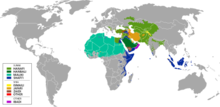
Islamic schools of law in the Muslim world
A school of jurisprudence is referred to as a madhhab (Arabic: مذهب). The four major Sunni schools are the Hanafi, Maliki, Shafi’i, Hanbali madhahs while the three major Shia schools are the Ja’fari, Zaidi and Isma’ili madhahib. Each differs in their methodology, called Usul al-fiqh (“principles of jurisprudence”). The following of decisions by a religious expert without necessarily examining the decision’s reasoning is called taqlid. The term ghair muqallid literally refers to those who do not use taqlid and, by extension, do not have a madhab.[123] The practice of an individual interpreting law with independent reasoning is called ijtihad.[124]
Economics
To reduce the gap between the rich and the poor, Islamic economic jurisprudence encourages trade,[125] discourages the hoarding of wealth and outlaws interest-bearing loans (i.e. usury; Arabic: riba).[126][127] Therefore, wealth is taxed through Zakat, but trade is not taxed. Usury, which allows the rich to get richer without sharing in the risk, is forbidden in Islam. Profit-sharing and venture capital where the lender is also exposed to risk is acceptable.[128] Hoarding of food for speculation is also discouraged.[129]
The taking of land belonging to others is prohibited. The prohibition of usury and the revival of interest-based economies has resulted in the development of Islamic banking. During the time of Muhammad, any money that went to the state was immediately used to help the poor. Then, in AD 634, Umar formally established the welfare state Bayt al-Mal (“House of Wealth”), which was for the Muslim and Non-Muslim poor, needy, elderly, orphans, widows, and the disabled. The Bayt al-Maal ran for hundreds of years under the Rashidun Caliphate in the 7th century, continuing through the Umayyad period, and well into the Abbasid era. Umar also introduced child support and pensions.[130][131][132]
Jihad
Jihad means “to strive or struggle [in the way of God]”. In its broadest sense, it is “exerting one’s utmost power, efforts, endeavors, or ability in contending with an object of disapprobation”. Depending on the object being a visible enemy, the Devil and aspects of one’s own self (like sinful desires), different categories of jihad are defined.[133] Jihad also refers to one’s striving to attain religious and moral perfection.[134][135] When used without a qualifier, jihad is understood in its military form.[133][134] Some Muslim authorities, especially among the Shia and Sufis, distinguish between the “greater jihad”, which pertains to spiritual self-perfection, and the “lesser jihad”, defined as warfare.[136][137]
Within Islamic jurisprudence, jihad is usually taken to mean military exertion against non-Muslim combatants.[137][138] Jihad is the only form of warfare permissible in Islamic law and may be declared against illegal works, terrorists, criminal groups, rebels, apostates, and leaders or states who oppress Muslims.[136][137] Most Muslims today interpret Jihad as only a defensive form of warfare.[139] Jihad only becomes an individual duty for those vested with authority. For the rest of the populace, this happens only in the case of a general mobilization.[137] For most Twelver Shias, offensive jihad can only be declared by a divinely appointed leader of the Muslim community, and as such, is suspended since Muhammad al-Mahdi’s occultation in 868 AD.[140][141]
Mysticism
Sufism (Arabic: تصوف, tasawwuf), is a mystical-ascetic approach to Islam that seeks to find a direct personal experience of God. It is not a sect of Islam and its adherents belong to the various Muslim denominations. Classical Sufi scholars defined Tasawwuf as “a science whose objective is the reparation of the heart and turning it away from all else but God”, through “intuitive and emotional faculties” that one must be trained to use.[142][143] Sufis themselves claim Tasawwuf is an aspect of Islam similar to sharia, inseparable from Islam and an integral part of Islamic belief and practice.[144] Sufi congregations form orders (tariqa) centered around a teacher (wali) who traces a spiritual chain back to Muhammad.[145]
The religiosity of early Sufi ascetics, such as Hasan al-Basri, emphasized fear of failing God’s expectations of obedience, in contrast to later and more prominent Sufis, such as Mansur Al-Hallaj and Jalaluddin Rumi, whose religiosity is based on love towards God. For that reason, some academic scholars refuse to refer to the former as Sufis.[146] Nevertheless, Hasan al-Basri is often portrayed as one of the earliest Sufis in Sufi traditions[147] and the influential theologian Al-Ghazali later developed his ideas.[citation needed] Traditional Sufis, such as Bayazid Bastami, Jalaluddin Rumi, Haji Bektash Veli, Junaid Baghdadi, and Al-Ghazali, argued for Sufism as being based upon the tenets of Islam and the teachings of the prophet.[148][149] Sufis played an important role in the formation of Muslim societies through their missionary and educational activities.[150][151][152]
Popular devotional practices such as the veneration of Sufi saints have faced stiff opposition from followers of Wahhabism, who have sometimes physically attacked Sufis, leading to a deterioration in Sufi–Salafi relations. Sufism enjoyed a strong revival in Central Asia and South Asia. Sufi influenced Ahle Sunnat movement or Barelvi movement defends Sufi practices and beliefs with over 200 million followers in south Asia,[153][154][155] Sufism is prominent in Central Asia, where different orders are the main religious sources,[156][157] as well as in African countries like Tunisia, Algeria, Morocco, Senegal, Chad and Niger.[158][159]
Ismaili Shias, as well as by the Illuminationist and Isfahan schools of Islamic philosophy have developed mystical interpretations of Islam.[160]
Society
Family life
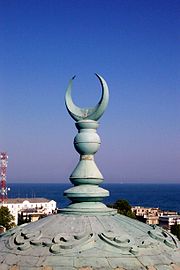
The dome of the Grand Mosque in Constanța, Romania, topped by the Islamic crescent
In a Muslim family, some religious ceremonies attend the birth of a child. Immediately after the birth, the words of Adhan are pronounced in the right ear of the child.[161] On the seventh day, the aqiqah ceremony is performed, in which an animal is sacrificed and its meat is distributed among the poor.[162] The child’s head is shaved, and an amount of money equaling the weight of its hair is donated to the poor.[162] Apart from fulfilling the basic needs of food, shelter, and education, the parents or the elderly family members undertake teaching moral qualities, religious knowledge and religious practices to the children.[163] Marriage, which serves as the foundation of a Muslim family, is a civil contract that consists of an offer and acceptance between two qualified parties in the presence of two witnesses. The groom is required to pay a bridal gift (mahr) to the bride, as stipulated in the contract.[164] Most families in the Islamic world are monogamous.[165][166] Polyandry, a practice wherein a woman takes on two or more husbands, is prohibited in Islam.[167] However, Muslim men are allowed to practice polygyny and can have up to four wives at the same time, per Surah 4 Verse 3. A man does not need approval of his first wife for a second marriage as there is no evidence in the Qur’an or hadith to suggest this. With Muslims coming from diverse backgrounds, including 49 Muslim-majority countries, plus a strong presence as large minorities throughout the world, there are many variations on Muslim weddings. Generally, in a Muslim family, a woman’s sphere of operation is the home and a man’s corresponding sphere is the outside world. However, in practice, this separation is not as rigid as it appears.[168] Regarding inheritance, a son’s share is double that of a daughter’s.[xvii]
Certain religious rites are performed during and after the death of a Muslim. Those near a dying man encourage him to pronounce the Shahada as Muslims want their last word to be their profession of faith. After death, according to Islamic burial rituals, members of the same gender bath the body appropriately and enshrouded it in a threefold white garment called kafan.[169] The Salat al-Janazah (“funeral prayer”) is said over the bathed and enshrouded body. Placing it on a bier, the body is first taken to a mosque where the funeral prayer is offered for the deceased, and then to the graveyard for burial.
Etiquette and diet
Many practices fall in the category of adab, or Islamic etiquette. This includes greeting others with “as-salamu ‘alaykum” (“peace be unto you”), saying bismillah (“in the name of God”) before meals, and using only the right hand for eating and drinking. Islamic hygienic practices mainly fall into the category of personal cleanliness and health. Circumcision of male offspring is practiced in Islam. Muslims are restricted in their diet. Prohibited foods include pork products, blood, carrion, and alcohol. All meat must come from a herbivorous animal slaughtered in the name of God by a Muslim, Jew, or Christian, except for game that one has hunted or fished for them self. Food permissible for Muslims is known as halal food.[170]
Social responsibilities
Righteousness is not in turning your faces towards the east or the west. Rather, the righteous are those who believe in God, the Last Day, the angels, the Books, and the prophets; who give charity out of their cherished wealth to relatives, orphans, the poor, needy travelers, beggars, and for freeing captives; who establish prayer, pay alms-tax, and keep the pledges they make; and who are patient in times of suffering, adversity, and in the heat of battle. It is they who are true ˹in faith˺, and it is they who are mindful ˹of God˺.
— Quran (2:177)
In Muslim society, members of the community perform various social service activities. As these activities are instructed by Islamic canonical texts, a Muslim’s religious life is seen as incomplete if not attended by service to humanity.[171] In fact, in Islamic tradition, the idea of social welfare has been presented as one of its principal values.[171] Quran 2:177 is often cited to encapsulate the Islamic idea of social welfare.[xviii][172]
Similarly, duties to parents, neighbors, relatives, the sick, the old, and minorities have been defined in Islam. Respecting and obeying one’s parents, and taking care of them especially in their old age have been made a religious obligation.[163][173] A two-fold approach is generally prescribed regarding duty to relatives: keeping good relations with them, and offering them financial help if necessary.[174] Severing ties with them has been admonished. Regardless of a neighbor’s religious identity, Islam teaches Muslims to treat neighboring people in the best possible manner and not to cause them any difficulty.[175][176] The Quran forbids harsh and oppressive treatment of orphaned children while urging kindness and justice towards them, and rebukes those who do not honor and feed them.[xix]
Character
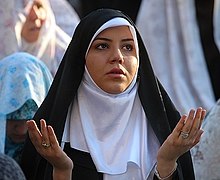
Islamic veils represent modesty
The Quran and the sunnah of Muhammad prescribe a comprehensive body of moral guidelines for Muslims to be followed in their personal, social, political, and religious life. Proper moral conduct, good deeds, righteousness, and good character come within the sphere of the moral guidelines.[177] In Islam, the observance of moral virtues is always associated with religious significance because it elevates the religious status of a believer[178] and is often seen as a supererogatory act of worshiping.[179] One typical Islamic teaching on morality is that imposing a penalty on an offender in proportion to their offense is permissible and just; but forgiving the offender is better. To go one step further by offering a favor to the offender is regarded as the peak of excellence.[178] The Quran says: “Good and evil cannot be equal. Respond ˹to evil˺ with what is best, then the one you are in enmity with will be like a close friend.”[xx] Thus, a Muslim is expected to act only with good manners as bad manners and deeds earn vices.[180] The fundamental moral qualities in Islam are justice, forgiveness, righteousness, kindness, honesty, and piety.[177] Other mostly insisted moral virtues include but are not limited to charitable activities, fulfillment of promise, modesty (haya) and humility, decency in speech, tolerance, trustworthiness, patience, truthfulness, anger management, and sincerity of intention.
As a religion, Islam emphasizes the idea of having a good character as Muhammad said: “The best among you are those who have the best manners and character.”[xxi] In Islam, justice is not only a moral virtue but an obligation to be fulfilled under all circumstances.[181] The Quran and the hadith describe God as being kind and merciful to His creatures, and tell people to be kind likewise. As a virtue, forgiveness is much celebrated in Islam, and is regarded as an important Muslim practice.[182] On modesty, Muhammad is reported as saying: “Every religion has its characteristic, and the characteristic of Islam is modesty.”[183]
Government
Mainstream Islamic law does not distinguish between “matters of church” and “matters of state”; the scholars function as both jurists and theologians. Currently, no government conforms to Islamic economic jurisprudence, but steps have been taken to implement some of its tenets.[184][185][186] The Sunni and Shia sectarian divide effects intergovernmental Muslim relations such as between Saudi Arabia and Iran.[187]
.
